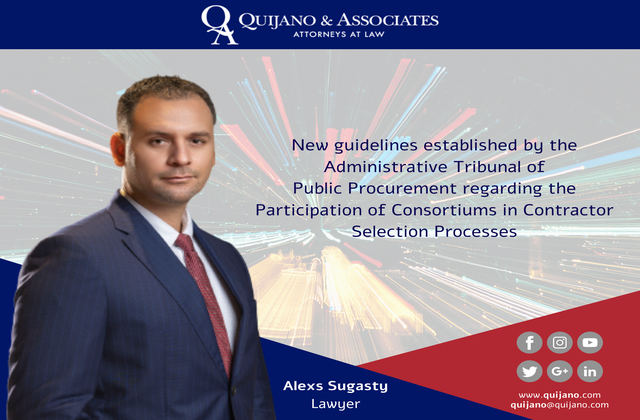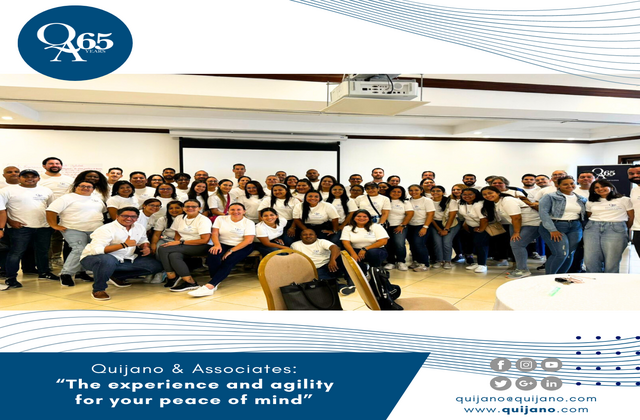New guidelines established by the Administrative Tribunal of Public Procurement regarding the Participation of Consortiums in Contractor Selection Processes

I. Introduction
As it has been widely explained by philosophers, jurists and doctrinarians, Natural Law is immutable, so that according to the English philosopher and physician John Locke, “Natural Law is the pure representation of the values of nature and the very conscience of man”. In this sense, when we speak of natural law, we refer to a set of legal rules and principles derived from the nature and human reason, as immutable and universal principles. In this same line of thought, Professor Miguel Grande Yanez, in his work “The mutability of Natural Law”, page 260, he stated with particular forcefulness that if “Natural Law were to present fissures in its contents it would mean the fall of man”, but the same does not occur with positive law, understood as that set of written legal rules, which have become so once all the necessary conditions have been met to become laws in accordance with the natural constitution of a country, which is naturally dynamic and mutable.
The norms that regulate the contractors selection processes in the field of public procurement in Panama are the perfect example of mutability, since, for example, since the year of birth of the current Law (Law 22 of 2006), it has undergone 19 modifications, which leaves us, the jurists who study this matter, with the constant task of keeping ourselves updated with such changes.
In our opinion, as a reflection of the constant variations of the regulatory norms of public procurement in Panama and due to the changes of administration, similar mutability is experienced by the pronouncements of the entities of supervision and control of the administrative acts in governmental resort that are issued according to the guidelines of Law 22 of June 27, 2006 (hereinafter “Public Procurement Law”). It is precisely on these new criteria recently issued by the Administrative Tribunal of Public Procurement (TADCP), regarding the Participation of Consortiums in Contractor Selection Process, that we will make a brief but important considerations in this article.
II. New Criteria
1. Obligation to Establish in the Consortium Form the Member of the Joint Venture that Holds the Fiscal, Civil and Labor Responsibilities.
There is a large number of requirements requested by all public entities in their lists of charges, which in addition to the guidelines specifically set forth in the list of charges, are governed by special laws or by the provisions of the text of the Public Procurement Law itself, as is the case of the consortium formation form, which in addition to the requirements established specifically for each bidding process in the respective lists of charges, it is governed by other requirements of legal rank that complement the wording of the requirement set forth in the list of charges, whereby, as confirmed by the Administrative Tribunal of Public Procurement (TADCP), according to its Resolution No. 183-2022-PLENO/TACP of September 15, 2022 (Decision), the obligation to establish in the Consortium Agreement form itself, is clearly enshrined at the legal level in Article 5 of the Unified Text of Law 22 of June 27, 2006, ordered by Law 153 of 2020 and is as follows:
Article 5. Consortium or joint venture. Two or more persons may submit the same proposal jointly for the award, execution, and performance of a contract, jointly and severally liable for each one of the obligations arising from the proposal and the contract.
Therefore, the actions, facts and omissions that occur in the development of the proposal and the contract will affect all the members of the consortium or joint venture.
The members of the consortium or joint venture must designate the person who, for all purposes, will represent them, and indicate the basic and minimum conditions that the document of establishment of the consortium or joint venture must have in order to clearly establish the party or parties that will assume the fiscal, civil, labor or any other type of liability that may arise as a consequence of the execution of a public contract, which the parties that make up the consortium must have among themselves, without prejudice to the joint and several liability before the State.
Therefore, the criterion that Article 5 requires that the basic conditions governing the consortium relations must be expressly stated “in the document of establishment of the consortium” has become a precedent and furthermore, the rule defines what those basic conditions are and specifies textually that among them is “to clearly establish the parties that will assume the fiscal, civil, labor or any other type of liability”, all this without prejudice to the joint and several liability before the State; that is to say, although by law it is established that the consortia are jointly and severally liable before the State, it is a legal obligation of the bidders to clearly establish the member of the consortium that holds the fiscal, civil and labor liabilities in the consortium incorporation document.
2. Lack of Legal Capacity Attributable to the Consortia to be Holders and Sign Letters of Intent for Financing.
In two recent rulings, the TADCP has confirmed that according to its criteria, consortia, being joint ventures and lacking legal capacity, cannot be the holders of a letter of intent to finance, much less to sign it, which undoubtedly extends to other documents that are usually requested in contractor selection process, such as bank references and similar documents that require their holder to have legal capacity.
The criterion that we hereby state, has been recently confirmed by the Administrative Tribunal of Public Procurement itself, through the issuance of its Resolutions No. 183-2022-PLENO/TACP of September 15, 2022 (Decision) and Resolution No. 142-2022-PLENO/TACP of August 3, 2022 (Decision), which did not have any dissenting vote and by means of which said superiority in governmental proceedings established its criteria that the commission should not have evaluated the letter of intent of financing submitted in that bidding by a bidder, taking into consideration that the same had been issued in the name of the joint venture (Consortium) and not in the name of any of its members.
Let us see the conclusion of the TACP by means of its administrative act contained in Resolution No. 142-2022-PLENO/TACP of August 3, 2022 (Decision):
The Court of the case is of the opinion that the Commission should not have valued said document, because the letter was issued in the name of the Consortium, and we agree with the DGCP, stating that the consortium does not have legal capacity.
“See page 57 of Resolution No. 142-2022-PLENO/TACP of August 3, 2022 (Decision)”.
There is a large number of interesting and dynamic criteria that the TADCP has established to date regarding different topics that if not known by the proponents could be disqualified, so it is mandatory to remain vigilant and studious of the pronouncements of this collegiate.
III. CONCLUSION
In order to avoid situations of disqualification due to non-compliance with mandatory minimum requirements in contractor selection processes, it is necessary to hire the services and legal advice of a suitable lawyer who is up to date in these matters, for which Quijano & Associates is a forensic firm that has a great deal of experience and is constantly updated in this area.




